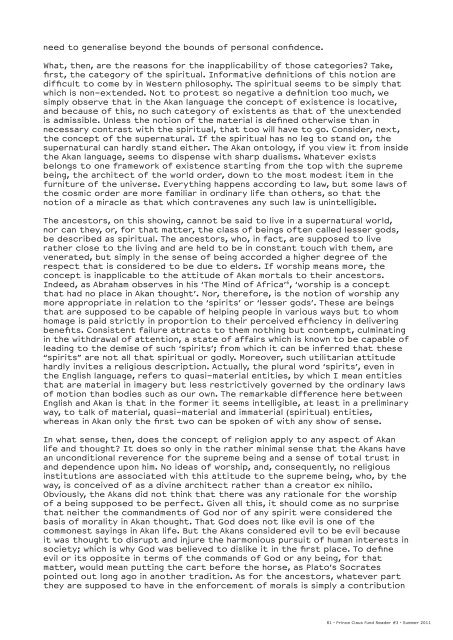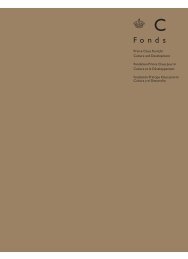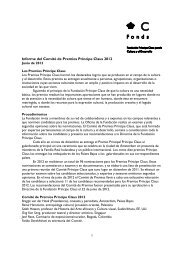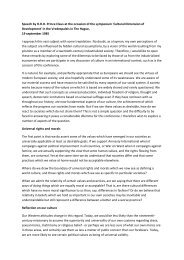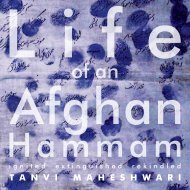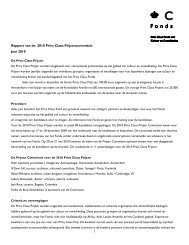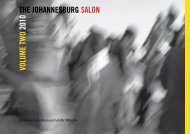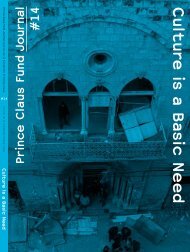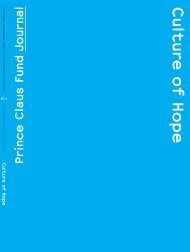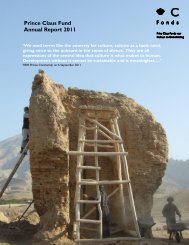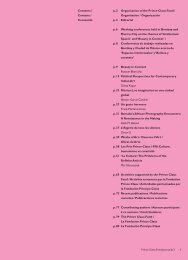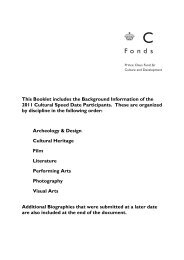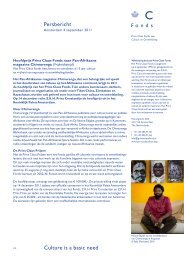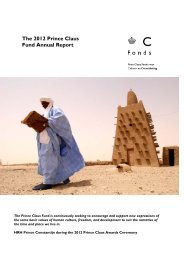3 summer 2011 - Prince Claus Fund
3 summer 2011 - Prince Claus Fund
3 summer 2011 - Prince Claus Fund
- No tags were found...
You also want an ePaper? Increase the reach of your titles
YUMPU automatically turns print PDFs into web optimized ePapers that Google loves.
need to generalise beyond the bounds of personal confidence.What, then, are the reasons for the inapplicability of those categories? Take,first, the category of the spiritual. Informative definitions of this notion aredifficult to come by in Western philosophy. The spiritual seems to be simply thatwhich is non-extended. Not to protest so negative a definition too much, wesimply observe that in the Akan language the concept of existence is locative,and because of this, no such category of existents as that of the unextendedis admissible. Unless the notion of the material is defined otherwise than innecessary contrast with the spiritual, that too will have to go. Consider, next,the concept of the supernatural. If the spiritual has no leg to stand on, thesupernatural can hardly stand either. The Akan ontology, if you view it from insidethe Akan language, seems to dispense with sharp dualisms. Whatever existsbelongs to one framework of existence starting from the top with the supremebeing, the architect of the world order, down to the most modest item in thefurniture of the universe. Everything happens according to law, but some laws ofthe cosmic order are more familiar in ordinary life than others, so that thenotion of a miracle as that which contravenes any such law is unintelligible.The ancestors, on this showing, cannot be said to live in a supernatural world,nor can they, or, for that matter, the class of beings often called lesser gods,be described as spiritual. The ancestors, who, in fact, are supposed to liverather close to the living and are held to be in constant touch with them, arevenerated, but simply in the sense of being accorded a higher degree of therespect that is considered to be due to elders. If worship means more, theconcept is inapplicable to the attitude of Akan mortals to their ancestors.Indeed, as Abraham observes in his ‘The Mind of Africa’ 6 , ‘worship is a conceptthat had no place in Akan thought’. Nor, therefore, is the notion of worship anymore appropriate in relation to the ‘spirits’ or ‘lesser gods’. These are beingsthat are supposed to be capable of helping people in various ways but to whomhomage is paid strictly in proportion to their perceived efficiency in deliveringbenefits. Consistent failure attracts to them nothing but contempt, culminatingin the withdrawal of attention, a state of affairs which is known to be capable ofleading to the demise of such ‘spirits’; from which it can be inferred that these“spirits” are not all that spiritual or godly. Moreover, such utilitarian attitudehardly invites a religious description. Actually, the plural word ‘spirits’, even inthe English language, refers to quasi-material entities, by which I mean entitiesthat are material in imagery but less restrictively governed by the ordinary lawsof motion than bodies such as our own. The remarkable difference here betweenEnglish and Akan is that in the former it seems intelligible, at least in a preliminaryway, to talk of material, quasi-material and immaterial (spiritual) entities,whereas in Akan only the first two can be spoken of with any show of sense.In what sense, then, does the concept of religion apply to any aspect of Akanlife and thought? It does so only in the rather minimal sense that the Akans havean unconditional reverence for the supreme being and a sense of total trust inand dependence upon him. No ideas of worship, and, consequently, no religiousinstitutions are associated with this attitude to the supreme being, who, by theway, is conceived of as a divine architect rather than a creator ex nihilo.Obviously, the Akans did not think that there was any rationale for the worshipof a being supposed to be perfect. Given all this, it should come as no surprisethat neither the commandments of God nor of any spirit were considered thebasis of morality in Akan thought. That God does not like evil is one of thecommonest sayings in Akan life. But the Akans considered evil to be evil becauseit was thought to disrupt and injure the harmonious pursuit of human interests insociety; which is why God was believed to dislike it in the first place. To defineevil or its opposite in terms of the commands of God or any being, for thatmatter, would mean putting the cart before the horse, as Plato’s Socratespointed out long ago in another tradition. As for the ancestors, whatever partthey are supposed to have in the enforcement of morals is simply a contribution81 · <strong>Prince</strong> <strong>Claus</strong> <strong>Fund</strong> Reader #3 · Summer <strong>2011</strong>


